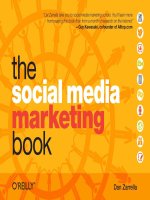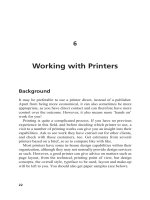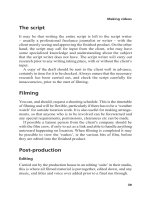Social media marketing in the covid19 văn nguyễn hoàng trân AEN T122WSB 6 21001345
Bạn đang xem bản rút gọn của tài liệu. Xem và tải ngay bản đầy đủ của tài liệu tại đây (115.55 KB, 9 trang )
ASSIGNMENT COVER SHEET
STUDENT DETAILS
Student
name:
Văn Nguyễn Hoàng Trân
UNIT AND TUTORIAL DETAILS
Unit
name:
Academic English
Tutorial/Lectur
e:
Group 2
Lecturer or Tutor
name:
Gabriel Ryan
Student ID
number:
21001345
Unit
number:
AEn-T122WSB-6
Monday, 12:00PMClass day and time: 3:15PM
ASSIGNMENT DETAILS
Title:
Length
:
Why is social media marketing is essential during the Covid-19 pandemic?
Due
Date
date:
8/4/2022
submitted:
11/4/2022
DECLARATION
xx I hold a copy of this assignment if the original is lost or damaged.
I hereby certify that no part of this assignment or product has been copied from any other
student’s work or from any other source except where due acknowledgement is made in the
assignment.
I hereby certify that no part of this assignment or product has been submitted by me in
another (previous or current) assessment, except where appropriately referenced, and
with prior permission from the Lecturer / Tutor / Unit Coordinator for this unit.
No part of the assignment/product has been written/ produced for me by any other
person except where collaboration has been authorised by the Lecturer / Tutor /Unit
Coordinator concerned.
I am aware that this work may be reproduced and submitted to plagiarism detection
software programs for the purpose of detecting possible plagiarism (which may retain a
copy on its database for future plagiarism checking).
Student’s
signature:
Tran
Note: An examiner or lecturer / tutor has the right to not mark this assignment if the above
declaration has not been signed.
The world is developing more and more, and information technology also gradually occupies a
large part in the fields of human life. The Internet has become an indispensable means of
connection in people's daily lives. That is why social media is a place for people to express their
feelings and opinions, and it is also gradually becoming an essential part of a marketing strategy.
‘All types of social media provide an opportunity to present oneself and one's products to
dynamic communities and individuals that may be interested’ (Roberts & Kraynak 2008).
Especially during the Covid-19 pandemic, social media have become the only tool for people to
communicate and go shopping. Due to this reason, social media marketing is critical during the
Covid-19 pandemic. Although many negative ramifications may derive from this suggestion, it is
convinced that social media strategies in terms of marketing are advantageous to both customers
and companies. To prove it, the change in consumer behaviour, brings benefits for businesses and
takes advantage of the customer will be analysed before a reasonable conclusion is drawn.
The covid-19 pandemic has changed many aspects of life. The change in consumer behaviour
became one of the big reasons social media marketing was important during the covid-19
pandemic. The first change in consumer behaviour is that customers order online more than
usual. Because of business closures and buyers' fear of getting the coronavirus in public, online
shopping surged in 2020. This trend continued until vaccinations became commonly accessible
in 2021. Additionally, consumer demand for goods increased worldwide, spent their stimulus
checks and shifted cash that would have gone toward travel and restaurants to home
improvements and decorations, among many other things. According to Adobe (2020), who
states that: internet shopping sales increased 103 per cent year over year in 2020, with US
customers spending $73.7 billion. In 2021, buyers kept up the pace, spending $79.2 billion on
online ordering, up 7.2 % from the prior year. Consumers today spend $6.7 billion on groceries
online each month, up from $3.1 billion pre-pandemic. According to Adobe, the category will hit
$85 billion in 2022. As a consequence of the developing growth of online shopping throughout
the outbreak, social media is regarded as a prospective and insightful market that plays a
strategically coordinated function in marketing in any firm during the Covid-19 pandemic.
One of the other causes of consumer changes is they were raised in fear of visiting stores.
Due to the coronavirus poses multiple health consequences, consumers have started to minimise
crowded areas since the outbreak of the Covid-19 epidemic. They have limited their shopping
through booths for direct items. Since the Covid-19 breakout, customers have been instructed to
avoid crowded places, maintain social distance in retail stores by shopping alone whenever
feasible, and avoid touching public surfaces. Being attractive to shoppers, these "new normal"
behaviours work against enclosed retail malls. That's how many Americans are afraid to go to the
local supermarket during the coronavirus outbreak, according to a recent survey by C+R
Research (2020). According to a poll released by the firm First Insight (2020), 32% of
respondents of individuals feel anxious or highly unsafe when visiting shopping centres. 80% of
women are scared to try on makeup and other beauty goods in stores, while 68% are hesitant to
try on clothes in dressing rooms, and 61% are scared of trying on shoes. As a result, to be
appropriate and respond appropriately to consumer changes, it is a fantastic idea to use social
media to promote convenience and assure customer safety throughout the Covid-19 pandemic is
correct and vital.
Another argument that proves that social media marketing is essential during the covid 19
epidemic is that it benefits the business. One of the first benefits of social media marketing to the
corporation is creating awareness and building brand image. Social media is a great way to get
ideas out there. According to Thota (2018), 93% of U.S. firms use Facebook and other social
media platforms like Twitter and LinkedIn. As a result, social media provides businesses with
online ways to build product/brand awareness among customers. Consumer-to-consumer
interactions on social media platforms also share product/brand experiences (Thota, 2018).
Therefore, social media allows businesses to increase brand awareness for their goods or
services. Especially during the covid-19 pandemic, the increase in using social media is not
unexpected. With many individuals suffering from social isolation or complete isolation, social
media platforms are becoming our only means of communication with the outside world. Almost
half of the internet users in studied nations (47%) say they have started spending more time on
social media, with approximately half of these users (23%) saying they have spent
"substantially" a higher quantity of time spent on social media than before the lockdown,
according to Digital 2020 April Global Statshot Report (2020). As we all know, most customers
are spending an incredible amount of time online to keep in touch and educated and keep their
attention engaged in the current scenario. This is the perfect moment for businesses to establish
themselves. Brands may run unique campaigns to grab the people's attention and convert them
due to the growing number of total people on social media. Consequently, social media
marketing may be incredibly beneficial to a company's sales.
In addition to the provision outlined above, social media marketing has a wide range of
advantages, including retained customers. Social media marketing makes it much easier for
consumers to obtain information about its products (Puspaningrum, 2020). Social media
marketing also demonstrates a good association with customer loyalty, connection, and trust
(Khoa, 2020). Social media marketing has increased communication and relationships between
customers and businesses. It is primarily viewed as a powerful tool for influencing consumers'
purchasing habits and loyalty. Customer behaviour because of the ongoing COVID-19 pandemic
and fears of nationwide lockdowns, as consumers stocked up on basics. Hoarding of home items
has been documented worldwide, resulting in a shortage of basic supplies such as toilet paper,
hygiene products, and hand sanitiser (Ward, 2020: Sheth 2020). In the meantime, social media
and the internet have skyrocketed (Donthu & Gustafsson, 2020). Because of the current
circumstances, businesses can only communicate with customers through social media and
online platforms. It is simple to use social media marketing to keep in contact with customers to
build loyalty throughout the covid-19 pandemic. During the pandemic, the popularity of social
media increased (as of January 2022, there were 4.62 billion social media users worldwide.
Which amounts to 58.4% of the global population). Lockdowns have been established in several
nations, with only critical products and services available. Global social media users have
expanded by more than 10% in the last 12 months, with 424 million new users commencing their
social media journey in 2021. In such situations, social media marketing aids firms in keeping in
touch with and retaining customers. Social media platforms also increase the number of visitors
to a company's website and other social media pages. This aids in the targeting of both current
and prospective customers.
During the Covid-19 pandemic, social media marketing not only brings benefits to businesses
but also takes advantage of customers. Meet the consumption needs of consumers and, at the
same time, ensure the safety factor would be the best benefit for the customer during the covid19 pandemic. When COVID-19 went off, customer behaviour changed dramatically, allowing the
company to identify their most loyal buyer in the public domain. This massive task is
unprecedented, forcing businesses to develop novel methods and adapt to new everyday
situations (Carnevale and Hatak 2020). Consumers' requirements, particularly necessities such as
food, clothes, protection, and health promotion, remain unaffected by distance, blockade, and the
"pause" of all activity. Consumers can accomplish these needs while maintaining security by
purchasing online because they do not have to travel to many locations.
Social media marketing creates a sense of "connectedness" that consumers can become
happier and relieve stress during a difficult time because of the coronavirus. As the COVID-19
virus begins its second year, super-advanced varieties have led to an increase in illnesses and
renewed lockdowns in numerous nations. The pandemic's devastation - millions of deaths,
economic turmoil, and extraordinary societal restrictions — has significantly impacted people's
mental health. Researchers worldwide are looking into the reasons and effects of this stress, and
some are concerned that the decline in mental health will last long after the pandemic has passed.
In December, more than 42% of adults surveyed by the US Census Bureau experienced anxiety
or depression symptoms, up from 11%. Other polls' findings show that the situation is similar
worldwide ('COVID's mental stress'). When a long-term isolation/blockade prevents people from
communicating with one another, social media marketing meets customers' shopping needs
through online shopping channels in an adequate and timely manner. As a result, through
purchase, payment, and delivery notifications are given via customers' messages/emails, online
shopping aids in the creation of a sense of "connection" to society.
In conclusion, a change in information technology and consumer behaviour during the Covid19 pandemic and social media marketing also take advantage of both businesses and customers.
It is convinced that social media marketing is essential during the Covid-19 pandemic and even
after that. Therefore, both small businesses and developed firms should adopt ‘the new style of
advertisement’ during a difficult time because of the coronavirus. In addition, corporations
should operate social media marketing wisely, especially in the era of Covid-19, with many
changes in many aspects of life.
REFERENCES.
Andrew N. Mason, John Narcum & Kevin Mason. (2021). Social media marketing gains importance
after Covid-19. Cogent Business &
Management. />needAccess=true
Abbott, A. (2021, February 3). COVID’s mental-health toll: how scientists are tracking a
surge in depression. Nature. />COVID’s impact on online shopping. (2021, June 16). Digital Commerce
360. />Deb, D. (2020, April 27). Trust - Retaining customers during the COVID-19 crisis - ClickZ.
ClickZ. />Dubbelink, S.I.; Herrando, C.; Constantinides, E. (2021, September 15). Social Media Marketing as a
Branding Strategy in Extraordinary Times: Lessons from the COVID-19 Pandemic. Sustainability
2021, 13(18), 10310. https://file:///C:/Users/ADMIN/Downloads/sustainability-13-10310v2%20(2).pdf
Fear of crowds - a 'new normal' shopping behaviour after COVID-19? (2021, April 7). University of
Portsmouth | Achieve Your Goals With Us. />Hieu, H. (2022, February 1). Bao CAO internet 2022 - Số Lieu digital ky thuật so - Mạng xã hoi. Top
10 bí ấn. />Joey. (2021, May 10). Benefits of social media marketing during COVID 19 pandemic.
GSM
Marketing Agency - Tucson, AZ. />McCandless, M. E. (2020, July 29). The COVID-19 impact: Are consumers still afraid to shop in
stores? Facility Executive Magazine. />Navithasulthana, A., Evangalin.R & Shanmugam,V. ( 2021, September ). Influence of social media
marketing in post-COVID-19.
ResearchGate. />marketing_in_post_COVID-19
Thomas, L. (2020, July 28). Shoppers are still wary of returning to malls, trying on clothes and
traveling. CNBC. />Simon, K. (2020, April 23). Digital 2020: April global Statshot — DataReportal – Global digital
insights. DataReportal – Global Digital Insights. />









